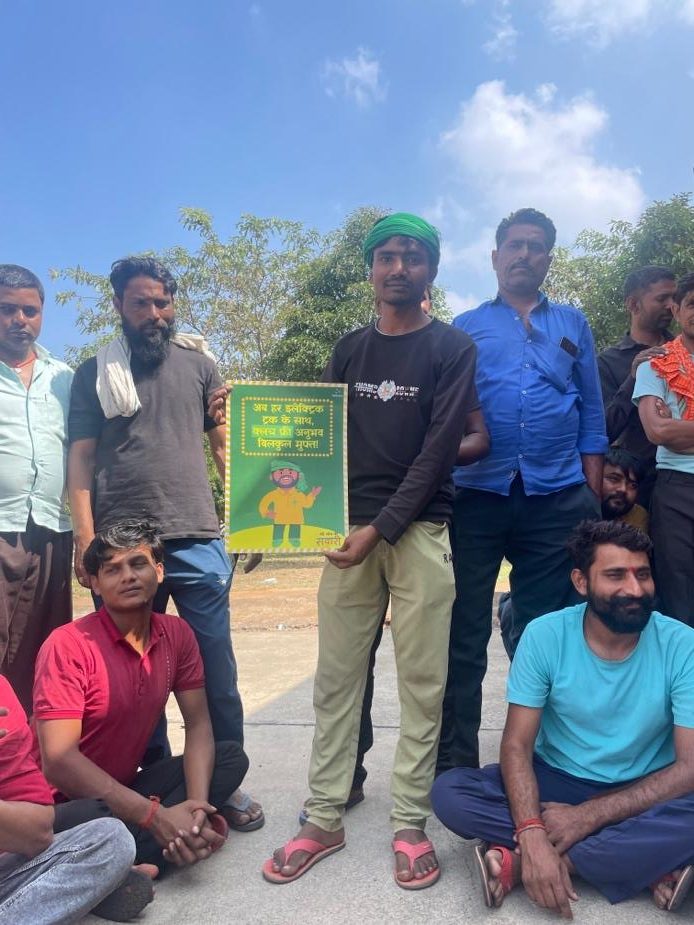“Electric trucks do not pollute and have lower operating costs. As the technology develops, feedback from users is being incorporated, and improvements will continue. Just as electric cars and bikes are becoming common, electric trucks are set to follow. With India’s rapid development, e-trucks will play a crucial role, helping reliance on imported diesel to drop significantly.” This observation was made not by a spokesperson of a government body or an industry expert but by Selvasundaram – a suspension specialist working in a Bengaluru workshop, voicing his insights during one of the hundred awareness events of the Nayi Soch Ki Sawaari initiative.
Selvasundaram is not alone. “Before we started this initiative, a dipstick survey showed that only 16% fleet operators thought that electric trucks could be a viable alternative to traditional diesel trucks. Now this number has reached 68% based on our field survey. These are more than just statistics. They are stories of people who are willing to be part of the solution – if they get the right support” says Kritica Mahajan, Project Lead, Nayi Sock Ki Sawaari.
India is stepping up efforts to accelerate zero-emission trucking through a mix of subsidies, infrastructure, and policy roadmaps. Landmark schemes like PM E-DRIVE, Production Linked Incentives, policy advisories for financing models, scaling-up charging infrastructure, and safety standards signal a transition that positions India to decarbonize, strengthen energy security, and build global leadership in clean transport solutions.
Yet, the people most impacted by this transition are often the last ones to be involved in the conversation. Often the drivers, mechanics and fleet operators, the very community that keeps the country’s freight system running, remain uninformed and unengaged. This gap not only slows down adoption but risks leaving those who have the most at stake in this shift vulnerable to misinformation. With 100 awareness sessions in 28 cities across 8 states, Nayi Soch Ki Sawaari (NSKS), is bridging this gap and taking this transition to a complex mosaic of drivers, mechanics and fleet operators operating across formal and informal players in multiple states. Anchored by the Centre of Excellence for Zero Emission Trucking (CoEZET) at IIT Madras, the initiative is part of a broader effort that includes policy support, skill development, and standard-setting to ensure that India’s transition to zero-emission trucking is not only ambitious but also inclusive and just.
On the value of engaging the community directly, Ajithkumar TK, CEO CoEZET says, “Policy becomes real only when it meets the people. We at CoEZET want to make sure that the trucking community is no longer on the sidelines of the clean freight transition. We have installed a three-step communication process – “Awareness, Acceptance, Adoption” to reach-out to “User layers”, the most important stakeholders in the trucking ecosystem. This first step is to make these stakeholders to be “aware” of the different aspects of truck electrification – the trends, advantages, challenges and technologies. The idea is to build a strong relationship based on trust. Once that relationship is in place, we plan to engage with them to help them “accept” the electrification journey – appreciating the benefits that accrue to them as well as the country and world at large. Finally, we will help them “adopt” truck electrification with the right tools, training and preparations. There are many people who are working with different Stakeholders for Truck Electrification – CoEZET is engaging with this mostly neglected community that is going to be most critical in the adoption of e-trucks.” With the right information and support drivers, mechanics, and fleet operators can be the champions that help accelerate this transition from the ground up.”
To put truckers at the heart of the clean freight conversation, NSKS collaborated with experts to bring information to life using jargon-free regional languages, accessible and easy-to-understand formats like games, videos, informal conversations, and radio shows. This not only helped tackle questions but also create a space where challenges could be explored openly, making these conversations feel both real and achievable.
While fleet operators express cautious optimism, due to concerns around upfront costs, charging infrastructure, range limitations, and uncertain demand, drivers are embracing the shift with enthusiasm. According to the NSKS field survey, 85% of driver participants were eager to try electric trucks, driven not just by the ease and comfort of operating them, but also by a strong desire to contribute to a cleaner future for their children. Nearly all attendees (96%) recognized the environmental benefits of electric trucks, underscoring a growing awareness and willingness to be part of the transition.
For every 1000 trucks in India, there are only 750 drivers- and decreasing. Meanwhile, the number of trucks in the logistics industry is projected to quadruple by 2050. In such a scenario, community centric initiatives like Nayi Soch Ki Sawaari are crucial not only to propel India’s electrification journey and achieve its ambitious policy goals, but also to scaffold driver retention and attract talent in this industry that is the logistics lifeline of India Inc..















